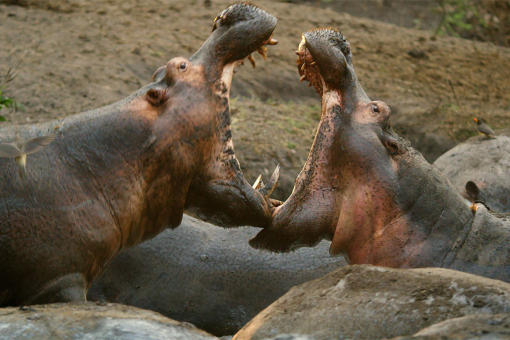It's been 50 years since Steven Spielberg made us afraid to go into the water. Released in movie theaters on June 20, 1975, Jaws was the first true movie blockbuster, and it changed the entertainment industry. It also kickstarted a widespread fascination with nature’s perfect predator.
Five decades later, we’re still fascinated. Need proof? Discovery’s annual Shark Week extravaganza begins its 38th consecutive year on July 6. Not to be outdone, Nat Geo’s competing Sharkfest, established in 2018, kicks off the same day but will air throughout July. Both are among their networks’ highest-rated events each year, and both pack equal measures of educational shows and more visceral fare.
Then there’s director Laurent Bouzereau’s feature-length documentary Jaws @ 50, airing July 10 on Nat Geo and streaming the next day on Disney+ and Hulu. The doc, which covers the making of the movie and its legacy, spends plenty of time with Spielberg and a murderer’s row of filmmakers, including George Lucas, Robert Zemeckis, James Cameron, J.J. Abrams, Guillermo Del Toro, Jordan Peele and Steven Soderbergh, plus Jaws superfan Emily Blunt.
 Photo credit: Adobe Stock Images
Photo credit: Adobe Stock Images
Why do sharks command all this attention? Howard Lee, chief creative officer of U.S. Networks and president of Discovery Networks, says, "They’re just such magnificent creatures. There’s a mystique attached to them. It never completely, year after year, gets resolved."
Jaws author Peter Benchley, who died in 2006, had a different take. "Peter once mentioned that, when writing Jaws, he had somehow inadvertently tapped into this primal fear that humans have about being eaten by an animal," recalls his friend, Nat Geo explorer and photographer Brian Skerry. "Particularly an animal they can’t see coming. It’s this real, visceral fear that he didn’t realize he would tap into."
Skerry, whose ocean-exploring career is at least partly inspired by the film, adds, "It’s part of our human psyche to both love and fear our monsters."
While he points out that humanity’s fascination with sharks dates back at least to John Singleton Copley’s famed 1778 painting Watson and the Shark, Skerry also acknowledges that the pop-culture phenomenon began with a movie that went wildly over budget and was almost abandoned mid-shoot — before eventually becoming the highest domestic-grossing film ever at that point. Adjusted for inflation, it’s still in the all-time box-office top 10.
The documentary came about after Benchley’s widow, Wendy, suggested some kind of commemoration to Bouzereau, who had made a shorter doc in 1995 to celebrate the film’s 20th anniversary. Once he got Spielberg interested, it all came together very quickly, as did that dream team of talent.
"If you mention Jaws and Steven Spielberg in the same sentence," Bouzereau says with a laugh, "you get people wanting to talk about it."
In the film, Spielberg reveals things he’s never previously discussed, including the PTSD he suffered after completing the film, the fact that all of Hollywood thought he was going to fail and that he was in constant fear of being fired as the movie kept shooting and shooting and shooting some more.
"He said, 'I thought this was the movie that was going to destroy me,'" Bouzereau recalls. "I get goosebumps even talking about it now."
The film also highlights how our feelings about sharks have changed: People used to want to hunt them, but now there’s more talk of saving them. It climaxes with footage of folks trying to return a beached shark to the sea, which would have been unthinkable even a few years ago. That shift is also reflected in the programming of both Sharkfest and Shark Week. What began as a ratings grab in the late ’80s has evolved into something far more important.
"It’s a very powerful platform for raising awareness and inspiring those conservation efforts, making it a positive force for marine life preservation," Lee says of Shark Week. "It’s very important that we highlight this annually, that it has evolved into a way to raise awareness."
This article originally appeared in emmy Magazine, issue # 7, 2025, under the title "Summer's Peak TV Predator."













